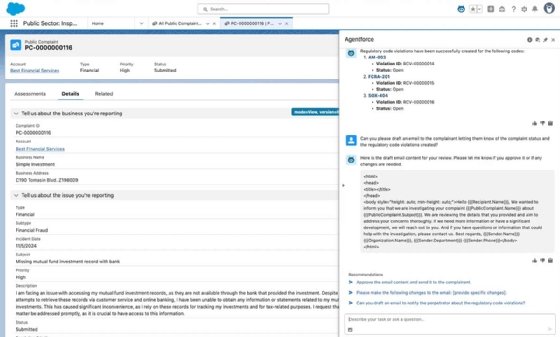
Getty Images/Tetra images RF
Salesforce Agentforce for Public Sector woos government users
Salesforce sets up MCP servers and testing environments for AI agents, and customizes Agentforce for the government vertical.
In recent days, Salesforce released Agentforce for Public Sector for government users and testing tools and benchmarks for all customers to use when developing AI agents.
Agentforce for Public Sector customizes Salesforce's AI agent platform to take on everyday tasks for state, local and federal governments. Those tasks might include automating permit applications, enforcing compliance, recruiting talent and fielding complaints from the public.
The city of Kyle, Texas, was an early adopter of Agentforce for Public Sector, using it to set up a 311 agent for constituents to report to the municipality non-emergency public hazards or nuisances, including downed signs, graffiti and potholes.
The Austin suburb, which claims to be the birthplace of the fajita, has had a hard time keeping up with population growth in recent years as tech companies such as Oracle, Tesla, Apple and others establish campuses in the area. Its population has nearly tripled since 2010 to more than 73,000 residents in 2025, making it one of the fastest-growing cities in the U.S., along with its Austin neighbors Georgetown and Leander.
The city decided to use agentic AI tools to help handle the growing 311 service desk, partly because it could scale along with the population, said Jesse Elizondo, Kyle's assistant city manager.
"I think a lot of small and midsize cities don't really think about -- as they continue to grow -- are you buying a system that works just for today, or are you buying a system that can keep up with you when your population doubles?" Elizondo said. "And not just keep up with what you bought it to do, but [also] keep up with modern technology [such as] AI."
The rollout of agentic AI features in Agentforce for Public Sector has begun, and Salesforce plans to release more features through October. Eventually, agents will support the streamlining of government hiring by scheduling interviews with job candidates, summarizing interview notes, creating offer letters and automating other processes that presently consume "a lot of calories," said Nasi Jazayeri, Salesforce executive vice president and general manager of Public Sector, Industries Cloud.
Salesforce's government customers want to keep humans in the loop, especially during critical processes such as hiring. The agents are designed to assist from initial recruitment to hiring but will remain under tight supervision as they perform actions.
"From phase one all the way to the offer letter … in the [hiring] journey, we try to make sure that agents are involved [but] the humans can look at it and tell the agent to take the next step, take the actions," Jazayeri said.

Agentic AI testing and benchmarking tools available
Salesforce AI Research has continued its work on benchmarking agent performance on common -- but sometimes complex -- CRM processes, and dashboarding the results. Salesforce calls the latest version of its benchmarks CRMArena-Pro, which tests agents as they dive deep into CRM data -- sometimes in tandem with other agents -- and perform processes such as sales forecasting, service triage and CPQ. These benchmarking tools use synthetic data to assure Salesforce users that their customer data isn't being used to train AI models.
Another tool, Agentic Benchmark for CRM, dashboards the performance of 10 agentic AI tasks such as live chat summaries, service call summaries and field service work order summaries. This tool analyzes agent performance in terms of accuracy, cost, speed, safety and sustainability across a number of popular large language models, including those from X, OpenAI, Google, Meta, IBM and others.
Finally, with the advent of Model Context Protocol (MCP) servers, which open application data sets to AI agents, new tools are needed to test how they work together. Salesforce released MCP-Eval and MCP-Universe, two benchmarking environments, the former for initial MCP server testing and the latter for developers to test them more deeply as they approach release.
Salesforce is creating these tools for a future where its agents work alongside agents from other companies to perform digital work, said Silvio Savarese, Salesforce Research executive vice president and chief scientist. Figuring out how to insert humans in the loop without overwhelming them with tasks from the various agents is one challenge, as well as how to reconcile the outcome when two agents might have conflicting goals in their assigned tasks. And, of course, security.
"The more interesting part is, when you start looking at how agents interact across organizations, there's a huge opportunity for addressing challenges such as authentication, registration, resource allocation and optimization," Savarese said.
Don Fluckinger is a senior news writer for Informa TechTarget. He covers customer experience, digital experience management and end-user computing. Got a tip? Email him.







